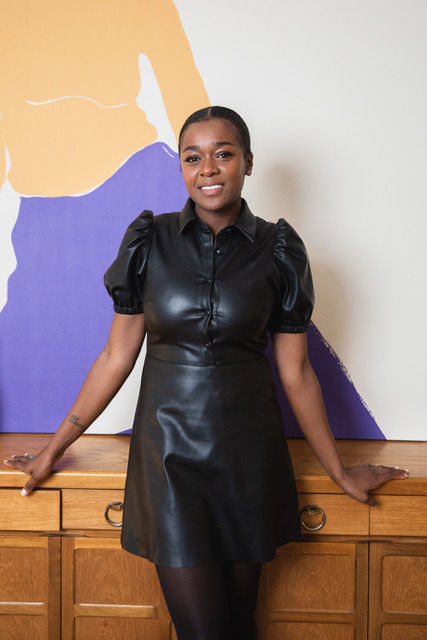 Lavinya Stennett is the founder and CEO of The Black Curriculum, a social enterprise set up to change the way Black history is taught in schools.
Lavinya Stennett is the founder and CEO of The Black Curriculum, a social enterprise set up to change the way Black history is taught in schools. She is also an author, activist and has been shortlisted for the 50th annual Bold Awards by Veuve Clicquot – she’s the youngest ever nominee for the Bold Future category.
I’m the founder and CEO of The Black Curriculum and I’m currently writing my first novel, Omitted, which will be published in 2023. The Black Curriculum is a social enterprise I launched in January 2019 to redefine the way Black history is taught in schools and empower all young people with lessons from the past. I’ve been passionate about levelling the playing field and educating people about Black history since my time studying African Studies at SOAS from 2016 to 2019.
Yes, but it didn’t take me where I am now. I’d planned to become a lawyer, but on graduating I realised I wanted to take what had been an initial passion project and turn it into a career. Within a few weeks this had become The Black Curriculum, a fully fledged social enterprise. Exiting university and immediately becoming a CEO is a fairly rare experience and I’ve had to be adaptable and enterprising to make this work, constantly thinking about new avenues that The Black Curriculum can take and alternating approaches to get the results the organisation needs. My passion about the cause and making tangible social change definitely makes this easier.
The Black Curriculum works with schools, local authorities and national government to address the lack of Black history being taught in UK schools and offering teacher training to change that. There’s a gap when it comes to understanding British history as it relates to Empire, and I launched this organisation because Black history isn’t just for Black people and shouldn’t be confined to one month of the year. Closing this understanding gap will equip students with a sense of identity and ultimately improve social cohesion among young people and wider society.
In just two and half years we’ve experienced tremendous growth, reaching more than 8,000 teachers and students and working with schools and local authorities across England, with additional UK expansion still to come. We’ve partnered with the likes of Universal Music, launched a clothing line collaboration with Off-White and Vogue and published our first series of books. I was also recently nominated for a Veuve Clicquot Bold Future Award, the world’s longest running award that celebrates pioneering female business entrepreneurship. It’s the fiftieth anniversary for the awards and being nominated in a milestone year is a great mark of how significantly this cause has grown and captured public consciousness in such a short space of time.
For me, a role model is someone who lives what they do. They don’t just say what they’re passionate about or discuss the change they want, they take the opportunity to work on issues that they care about. One really strong example of this is Olive Morris, a young female activist in the 1970s who campaigned for employment and housing for Black and Asian women. She was of Jamaican heritage from South London, so she’s a local hero to me.
This might be a slightly controversial opinion, but I feel two ways about it. Mentoring can exist as guidance or as spoonfeeding and I don’t support the latter. Nobody can provide you with the exact tools to implement the change you want in your life, tell you what to do or instruct you in how to achieve your personal ambitions. You have to find the tools yourself. Mentoring can help people realise their potential and it’s always great to have someone to bounce ideas off of, but it can also impair the mentee’s progress by relying too heavily on their mentor.
No surprises here, it would be education! It would be awesome if we could have adults and parents taking time to understand their history, their role within history and how modern society came to be. That awareness is essential to making a more diverse workplace. You can put people in diversity-related roles, you can hit quotas, but until those attitudes change then efforts to improve D&I will be slow. To fast track it, education is the key.
You don’t have anything to prove, you’re already amazing as you are. You just need to believe in that.
My next challenge is growing The Black Curriculum into a more mature organisation as we take the leap from startup to scaleup. We’ve experienced rapid growth and have been fortunate enough to collaborate with some amazing organisations. I now have to lead the way as the organisation expands into its next stage, reaching more young people and educating more minds.
In the future, I would like to achieve global education that produces tangible results for people of African and Caribbean backgrounds. This is something that we’re really working towards and it would be my dream to see everyone from these backgrounds – not just young people – learning more about their history and being empowered by it.
